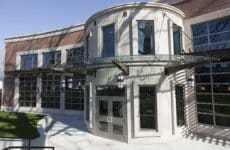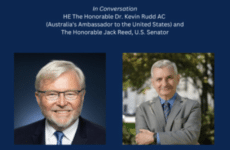By: Devon Cormier
Posted In: News

Photo credit: Stephanie Turaj
Salve students protest the chocolate industry’s use of slave labor outside the O’Hare Academic Center.
When biting into a sweet and delicious Hershey’s chocolate bar, most people don’t bother to think about where the chocolate came from, and especially don’t want to think that their sweet treat was made using child and slave labor. But in reality, Hershey’s chocolate is not “fair trade” certified. A group of Salve students decided to raise awareness about this issue and show that what we eat should not be taken for granted.
On Nov. 11, the air was frigid and the wind was restless, but this did not stop these students from taking a stand. Lined up shoulder to shoulder, hands bound by a single long rope, the students stood outside, braving the weather to represent those suffering from child slave labor. These petitioners asked each passer-by to stand with them for “just two minutes.” If a passer-by was in a rush to class, he or she could have always joined the group later, for the protestors gathered outside from 8 a.m. until about 1 p.m., regrouping during the 15 minute periods between classes. The demonstration was organized by Danielle Macedo, Kelsey Fitzgibbons, Whitney Lafreniere and Megan Quinn, all Salve seniors. After watching a film called “Bird Song and Coffee” in their International Social Work class, the students were inspired by the social and environmental issues surrounding the coffee industry raised in the film. They used this idea as a springboard for their social action project in that same class. After some careful research, the students decided to target the idea of fair trade markets in the chocolate industry, with a focus on Hershey’s chocolate. The girls started to plan a demonstration outside of O’Hare to promote awareness for both the child slave labor and the exploitation of farmers involved with the Hershey’s Chocolate Co. In addition to the spectacle of rope outside, they drew up a petition for students, faculty, staff or anyone passing by to sign. The petition was a request for Hershey’s to become fair trade certified. Currently, the company is not, and as a result, working conditions at the company are far below subpar. Commenting on the petition, Kelsey Fitzgibbons said that the goal of all of this is not to change people’s purchasing habits, but instead “raise awareness and know how to make a conscious decision.” Fitzgibbons also discussed about the issue with Mark Rodriguez, the head of Sodexo at Salve. Fitzgibbons would like Salve to have fair trade chocolate as an purchasing option, but not a replacement, in Miley Hall, Global Café and Jazzman’s Café. Rodriguez is currently looking into the issue. In addition to the petition, 100 T-shirts were designed, and those who received one were asked to wear the shirt around campus on Thursday. The T-shirts were simple: they consisted of an image of a Hershey’s chocolate bar, but instead, the name “Hershey’s” was replaced by the word “Exploitation,” along with the sub-label of “slave labor chocolate.” The 100 shirts quickly ran out. With each shirt that was given away, a small flier explaining the shirt was handed out. It read, “These shirts represent the children who work under inhumane conditions every day. They represent the struggle to survive and to provide for their families. They represent the stand against child and slave labor throughout the world. Mostly, they represent your desire to take that stand and give a voice to those who don’t have one.” According to the statistics the girls found, about 43 percent of chocolate is produced in the Ivory Coast, which is where Hershey’s gets its cocoa product from. The majority of the workers in the Ivory Coast chocolate industries are children between the ages of 8 and 12. Most of them work 80 to 100 hours a week in inhumane conditions for little or no pay and little or no food. Many of the children were human trafficked in from Mali, which borders the coast in the north. In most cases the children are tricked into slave labor. Someone will usually come into the village and promise them an education, the children will unknowingly accept the offer, and then end up in a factory or sweat shop somewhere far from the village. They have no way of returning home, and often families have no idea about the whereabouts of those gone missing, or taken. To spread even more awareness about this issue, Macedo, Fitzgibbons, Whitney, and Lafreniere plan to show a film with a following panelist discussion Monday night in Bazarsky lecture hall at 7 p.m. They are strongly urging everyone to attend. The film is called “The Dark Side of Chocolate,” and it discusses the issues of the chocolate industry, but in much more detail. They have also managed to have a spokesperson from “Equal Exchange,” a fair trade company based out of West Bridgewater, Mass., come to speak on a panel and answer questions. Ultimately, the petition and rally were a success. Given this, the girls are hoping that the film showing and panel discussion on Monday evening will have an excellent turnout. If all goes well, and there is enough interest in the matter, the girls may even consider making a club on campus dedicated to the cause.













